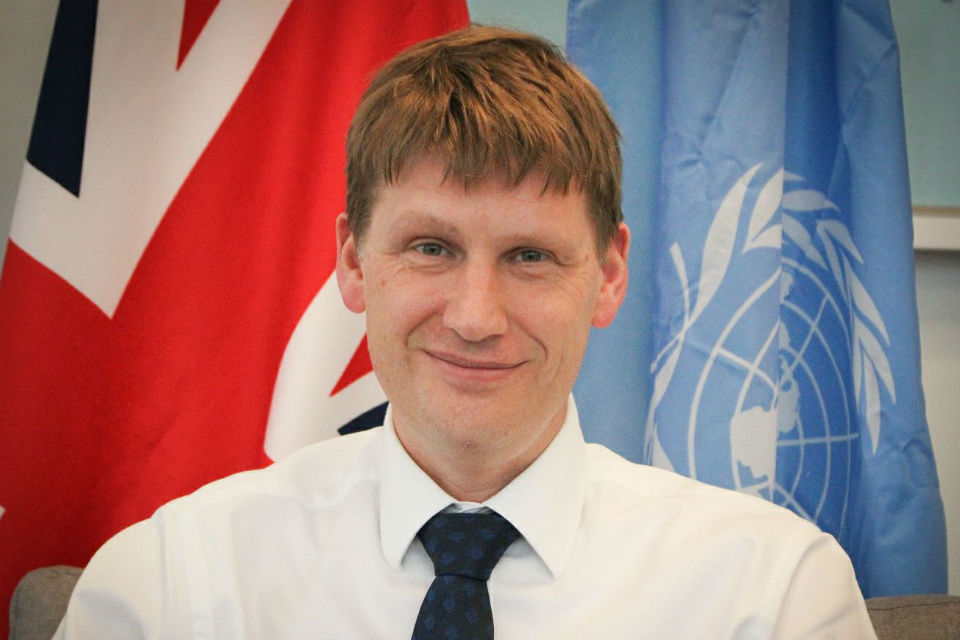
Well, Mr President, thank you. It is customary for all Security Council members to thank the President of the day for convening a debate on an important topic.
Mr President, preventative diplomacy is a vital tool for this Council in maintaining and restoring international peace and security and it's a tool we do not use often enough. We cannot simply pay lip service to the primacy of political solutions to conflict. And collectively, this Council should be willing to engage with slow burning political crises before they flare up into open conflict. That's why in the open debate in the UK's presidency last August, we held a debate about mediation. So Mr President, thank you for convening this debate on an important issue.
Let me pay tribute to the efforts of the African Union and African sub-regional organisations in this regard. The AU took swift and decisive action in June in response to a brutal crackdown on peaceful protesters in Sudan and the AU's subsequent mediation was crucial in supporting Sudan's transition to civilian-led government. I'm pleased that this Council was ultimately able to express its support for the African Union's position on Sudan in June, thanks in no small measure to the leadership of our African colleagues here on the Council.
Our conflict prevention and resolution efforts work best where the United Nations, the African Union and sub-regional organisations coordinate to leverage their comparative advantages. We've seen this in the Central African Republic, where the United Nations and African Union continue to play a vital role in supporting implementation of the peace agreement. And I hope we will see further such coordinated efforts and actions to encourage peaceful dialogue and political processes.
In South Sudan, we urge the regional governments with the African Union, the United Nations and all interested actors to encourage the parties to make further progress in implementing the revitalised peace agreement ahead of the critical 12 November deadline. That should include further direct contact between President Kiir and Riek Machar. And I hope the Security Council is able to play a helpful role during its visit under your leadership, Mr President, and that of our US colleagues later this month.
In Cameroon, the United Kingdom welcomes the national dialogue, which took place last week, as an initial step to bring parties together to work towards peace. Further inclusive discussion about the root causes of grievances is urgently needed, and all parties must take action to address these grievances.
We are often asked to ensure space for African organisations to take the lead on African issues, and we therefore call on the African Union and the Economic Community of Central African States (ECCAS) to support an inclusive and peaceful resolution to the crisis in Cameroon.
And in Burundi, I welcomed our briefers' raising of the situation there. We encourage Burundian and regional actors to work together in the spirit of the Arusha Accords to make progress on a long-term solution to the political crisis ahead of the 2020 elections. And I hope that this this Council and the Peacebuilding Commission can and will remain fully engaged.
Now, Mr President, there is, of course, no 'one size fits all' approach to conflict prevention and resolution. In some contexts, we can best make headway by ensuring alignment by actors behind UN leadership, avoiding duplication of effort. And that is the case in the United Kingdom's opinion, for example, in Libya, where the international community should follow a single shared roadmap towards the resumption of a political process aligning behind Special Representative Salamé's leadership. Now, this emphatically does not mean marginalising regional voices. Rather, it means maximising the United Nations ability to leverage the support and expertise of all relevant actors, including the African Union, the League of Arab States and the European Union, behind a successful process.
Mr President, conflict prevention is of course preferable to conflict resolution, but that does require effective horizon scanning capacities. So I commend the work of the United Nations Secretariat and the African Union Commission on strengthening their ability to conduct joint analysis and reporting. I also commend DPPA for the useful horizon scanning discussion we held on Latin America some time ago. I hope to see the next one soon and that they take place more frequently hereafter. It is very good, I think, for members of the Council to have an informal opportunity to understand the situation in a range of countries not on the Council's agenda.
I also welcome the development of the African Union's Continental Early Warning System, which the United Kingdom is proud to support, including through funding secondee roles within the AU Commission.
Mr President, as we discussed in our debate on mobilising the youth last week, inclusive approaches to conflict prevention and resolution are key to a lasting peace. This means supporting women peace builders at the grassroots level and ensuring women's meaningful participation in peace processes, mediation and inter-communal dialogue. And we welcome efforts to this end, such as the AU's FEMWISE network, which the United Kingdom supports enthusiastically, and the Women Mediators across the Commonwealth initiative, to which the United Kingdom is contributing $1.5 million. We hope that more member states will offer their support to such initiatives, including through supporting the Global Alliance of Women Mediators, launched recently in the margins of High Level Week by the Secretary-General.
Thank you, Mr President.






